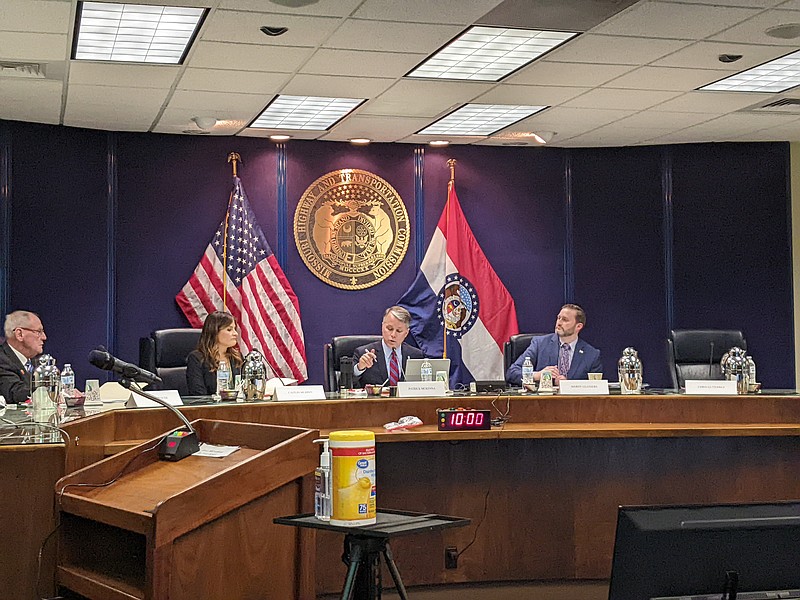Missouri's Supply Chain Task Force took initial steps Thursday and began reviewing current freight and transportation conditions in the state.
Facing the pressure of supply chain disruptions and slowdowns, Gov. Mike Parson signed an executive order last November to create the Supply Chain Task Force. It had its first meeting Thursday.
Supply chains refer to the process required to transport goods and products from suppliers and into the hands of consumers. In Missouri, they frequently involve the use of freight trucks, railroads, airports and river ports for shipping.
Co-chaired by Patrick McKenna, director of the Missouri Department of Transportation, and Mardy Leathers, director of Workforce Development, the task force is responsible for identifying supply chain issues specifically impacting Missouri businesses and the public, and developing recommendations for the state and private sector on how to resolve those issues.
The task force is also responsible for engaging with surrounding states on supply chain issues.
Several industry representatives sit on the task force, including: Chris Gutierrez, president of Kansas City SmartPort; Mary Lamie, executive vice president of bi-state development for Multi Modal Enterprises; Caitlin Murphy, founder and CEO of Global Gateway Logistics; Dustin Quesenberry, vice president of operations for Contract Freighters; and Todd Spencer, president of the Owner-Operator Independent Drivers Association.
Cooperation between public and private sectors, as well as with other states and stakeholders, will be critical for the task force's mission, McKenna said, because it will be making legislative and policy recommendations and developing suggestions for improving state interaction with the industry itself.
"I'm really excited to learn from this panel to work together to try to address some of the needs," he said.
After reviewing initial plans for future meetings, the task force set its eyes on MoDOT's draft multimodal freight network map.
A billion tons of goods, valued at over $1 trillion, moves through Missouri's supply chains each year.
The freight network, which incorporates critical transportation routes, consists of 8,236 miles of highway, three airports, more than 500 miles of railroad, and Missouri's 17 public ports and two marine highways (the Mississippi and Missouri Rivers).
"The final component in the network is waterways and, frankly, it's our best kept secret in the state of Missouri," said Cheryl Ball, administrator of waterways and freight for MoDOT.
An average of 500-600 million tons of freight are moved along the Mississippi River every day, Ball said, and Missouri alone moves 50-60 million tons on the river each day, with the predominant inventory being agricultural products.
Multiple members of the task force expressed interest in looking into container- on-barge shipping along the two rivers, which would present the opportunity to ship new products in less time.
The Missouri River received a marine highway designation from the U.S. Department of Transportation last year after a public and private partnership completed an application for a container-on-barge project to ease the burden of moving freight by highway or railroad.
The project would use available shipping containers, which Missouri has an abundance of, to more efficiently move products around the state and across the country.
"Missouri is definitely trying to go all in on that," Ball said. "This is an additional way to move other commodities onto the river. These are not competing systems, necessarily, for river, rail and highways and air -- we need the whole system to function well. We need them working together and to have efficient connections."
The task force also reviewed Missouri's current workforce landscape as it relates to transportation and the jobs involved with moving freight.
The Missouri Department of Revenue issues roughly 22,000 CDLs each year, but Leathers said many recipients leave the state to work elsewhere or use the license to operate farming equipment instead.
The state funded 393 CDL trainees in 2021, which cost taxpayers $1.8 million. Leathers said 59 percent of the state-funded trainees found direct employment after training, but the rate who remained employed in the trucking industry dropped to 33 percent in six months and was even lower at 12 months.
"We could do a great job and we could have the best infrastructure, the shiniest, the quickest or the most seamless, but if we don't have people to operate it, then -- as we can see and as we've learned or been reminded rather over the last two years -- it can be a big challenge," Leathers said.
He said there is a federal requirement taking effect Feb. 7 that will require drivers to attend a four- to five-week training program before taking the CDL skills test required to drive trucks and haul products.
That additional requirement could bottleneck workforce development in the industry, he said, because there won't be enough seats in training programs to keep up with demand.
Quesenberry, the task force member representing Contract Freighters, suggested the possibility of using state resources to expand training programs at publicly funded institutions.
Despite the challenges, multiple members of the task force expressed optimism for the future and the potential improvements to come.
"When you think about how we address some of the issues in the supply chain today, there's no magic bullet," Quesenberry said. "Lifestyle is certainly one of them ... and it's really around the edges. There's a lot of small things I think we need to bring to the industry to help improve not only the lifestyle, but as well as the attraction to the job."
The Supply Chain Task Force will meet several more times before submitting recommendations to the governor in June. Meetings will be held in locations around the state to better engage regional and local stakeholders, McKenna said.
The next meeting is scheduled for Feb. 10 in Jefferson City.

